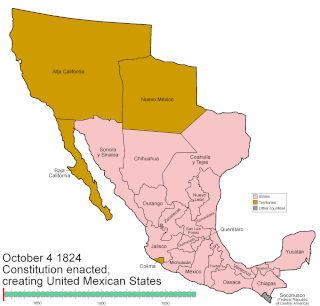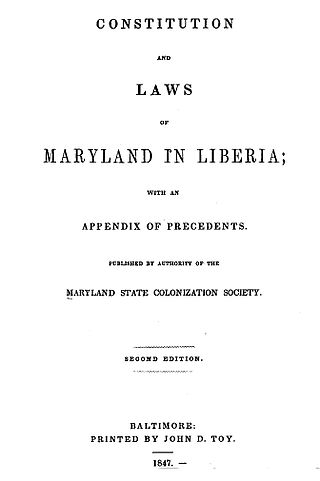Related Research Articles

Direct democracy or pure democracy is a form of democracy in which the electorate decides on policy initiatives without elected representatives as proxies. This differs from the majority of currently established democracies, which are representative democracies. The theory and practice of direct democracy and participation as its common characteristic was the core of work of many theorists, philosophers, politicians, and social critics, among whom the most important are Jean Jacques Rousseau, John Stuart Mill, and G.D.H. Cole.

The flag of Liberia or the Liberian flag, sometimes called the Lone Star, bears a close resemblance to the flag of the United States, representing Liberia's founding by former black slaves from the United States and the Caribbean. They are both part of the stars and stripes flag family.

A constituent assembly is a body assembled for the purpose of drafting or revising a constitution. Members of a constituent assembly may be elected by popular vote, drawn by sortition, appointed, or some combination of these methods. Assemblies are typically considered distinct from a regular legislature, although members of the legislature may compose a significant number or all of its members. As the fundamental document constituting a state, a constitution cannot normally be modified or amended by the state's normal legislative procedures in some jurisdictions; instead a constitutional convention or a constituent assembly, the rules for which are normally laid down in the constitution, must be set up. A constituent assembly is usually set up for its specific purpose, which it carries out in a relatively short time, after which the assembly is dissolved. A constituent assembly is a form of representative democracy.

Joseph Jenkins Roberts was an African-American merchant who emigrated to Liberia in 1829, where he became a politician. Elected as the first (1848–1856) and seventh (1872–1876) president of Liberia after independence, he was the first man of African descent to govern the country, serving previously as governor from 1841 to 1848. Born free in Norfolk, Virginia, Roberts emigrated as a young man with his mother, siblings, wife, and child to the young West African colony. He opened a trading firm in Monrovia and later engaged in politics.

Maryland County is a county in the southeastern portion of Liberia. One of 15 counties that comprise the first-level of administrative division in the nation, it has two districts. Harper serves as the capital with the area of the county measuring 2,297 square kilometres (887 sq mi). As of the 2008 Census, it had a population of 136,404, making it the seventh most populous county in Liberia.

Cape Palmas is a headland on the extreme southeast end of the coast of Liberia, Africa, at the extreme southwest corner of the northern half of the continent. The Cape itself consists of a small, rocky peninsula connected to the mainland by a sandy isthmus. Immediately to the west of the peninsula is the estuary of the Hoffman River. Approximately 21 km (15 mi) further along the coast to the east, the Cavalla River empties into the sea, marking the border between Liberia and the Côte d'Ivoire. It marks the western limit of the Gulf of Guinea, according to the International Hydrographic Organization (IHO).

David Stewart was an attorney and politician from Baltimore, Maryland. A Democrat, he was most notable for his service in the Maryland Senate and his brief service as an interim U.S. Senator from 1849 to 1850.
Amos Claudius Sawyer was a Liberian politician and academic who served as interim president of Liberia from 22 November 1990 to 7 March 1994. He was voted into office by 35 leaders representing seven political parties and eleven interest groups.

The Republic of Maryland was a country in West Africa that existed from 1834 to 1857, when it was merged into what is now Liberia. The area was first settled in 1834 by freed African-American slaves and freeborn African Americans primarily from the U.S. state of Maryland, under the auspices of the Maryland State Colonization Society.

Stephen Allen Benson was a Liberian politician who served as the second president of Liberia from 1856 to 1864. Prior to that, he served as the third vice president of Liberia from 1854 to 1856 under President Joseph Jenkins Roberts. Born in the United States, Benson was the first president to have lived in Liberia since childhood, having arrived with his family in 1822.

Mexico has experienced many changes in territorial organization during its history as an independent state. The territorial boundaries of Mexico were affected by presidential and imperial decrees. One such decree was the Law of Bases for the Convocation of the Constituent Congress to the Constitutive Act of the Mexican Federation, which determined the national land area as the result of integration of the jurisdictions that corresponded to New Spain, the Captaincy General of Yucatán, the Captaincy General of Guatemala and the autonomous Kingdoms of East and West. The decree resulted in the independence from Spain.

The Maryland State Colonization Society was the Maryland branch of the American Colonization Society, an organization founded in 1816 with the purpose of returning free African Americans to what many Southerners considered greater freedom in Africa. The ACS helped to found the colony of Liberia in 1821–22, as a place for freedmen. The Maryland State Colonization Society was responsible for founding the Republic of Maryland in West Africa, a short lived independent state that in 1857 was annexed by Liberia. The goal of the society was "to be a remedy for slavery", such that "slavery would cease in the state by the full consent of those interested", but this end was never achieved, and it would take the outbreak of the Civil War to bring slavery to an end in Maryland.

A constitutional referendum was held in Liberia on 7 May 1935, alongside general elections. The changes to the constitution ensured that President Edwin Barclay remained in office without the need for the presidential elections due that year. Although it was claimed to be for economic reasons, the government feared that an election may lead to instability that would lower confidence of foreign powers and creditors. The next elections took place in 1939.

A referendum on annexation by the United States was held in the Dominican Republic on 19 February 1870. The proposal was approved by 99.93% of voters, although turnout was just 30%. However, the United States Senate rejected the annexation on 30 June 1870 with a 28–28 vote.

A referendum on leasing the Samaná Peninsula to the United States for 99 years was held in the Dominican Republic on 19 February 1873. The proposal was approved by 99.91% of voters, but was never implemented after President Buenaventura Báez was overthrown on 2 January 1874.

A referendum on whether Antonio López de Santa Anna should remain President., and if not, who should replace him, was held in Mexico on 1 December 1854. The proposal was approved by 99.07% of voters. On 11 December Santa Anna ordered reprisal measures against those who had voted no. On 2 January 1855 he declared that the country had confirmed his position in office. He was subsequently overthrown on 8 December that year.
An independence referendum was held in the Maryland Colony on 31 January 1853. Only 122 people voted in the referendum, all in favor of independence.
A constitutional referendum was held in Maryland Colony on 29 March 1854. The new constitution was approved by voters and general elections were subsequently held on 15 May, before independence was declared on 8 June.

A referendum on becoming a US commonwealth was held in the Northern Mariana Islands on 17 June 1975. The proposal was approved by 79% of voters. As a result, the United States Congress approved the change of status on 24 March 1976.
Joseph Gibson (1823-1886) was an Americo-Liberian politician born in the United States.
References
- 1 2 3 4 Maryland in Liberia (Liberia), 24 February 1857: Integration with Liberia Direct Democracy (in German)
- ↑ Maryland in Liberia (Liberia), 31 January 1853: Independence Direct Democracy (in German)
- ↑ Maryland in Liberia (Liberia), 29 March 1854: Constitution Direct Democracy (in German)